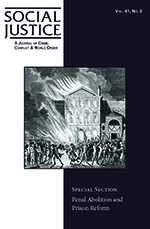Description
State Crime, Human Rights, and the Limits of Criminology
Authors Penny J. Green and Tony Ward suggest how criminology can remedy its neglect of the important phenomenon of state crime, without adopting such a broad definition of “crime” as to destroy the coherence of criminology as a distinct field. Their approach employs as examples the Anglo-American and Turkish state traditions in an attempt to establish a continuum that incorporates authoritarian and democratic state formations. Turkey is a democratizing state with an authoritarian historical backdrop, in which torture of detainees, extrajudicial killings and disappearances, violent public order policing, forced evacuations, the razing of whole villages, and the routine harassment of trade unionists, media workers, and human rights defenders form the human rights landscape. Although such violence is of a different order of magnitude than that employed in most liberal democracies, instances of violent crime by British and American state officials are not difficult to find. The recent Rampart revelations and allegations of brutality against officers at the Wormwood Scrubs and Wandsworth prisons in England are obvious examples, but the extent to which legally unjustifiable violence is routinely used by police to enforce social discipline in some working-class areas is less publicized. The article grapples with the difficulty of defining “state crime” using the state’s own legal criteria, as opposed to one that defines crime in terms of human rights. The latter approach is subdivided between the “torture paradigm,” which connects human rights with a shared perception of totally unacceptable evils that are never justified and undermine the claims to political legitimacy of any system of government, and the “health paradigm,” which emphasizes “second generation” human rights to well-being (health, education, meaningful work, etc.), as well as to freedom and bodily integrity. The authors propose that the term “state crime” (as applied to contemporary states) be restricted to the area of overlap between violations of human rights and state organizational deviance.
human rights; police abuse — Great Britain, United States; human rights; state crime; genocide; criminal justice — Turkey; criminology; Turkey — politics and government
Citation: Social Justice Vol. 27, No. 1 (2000): 101-115


